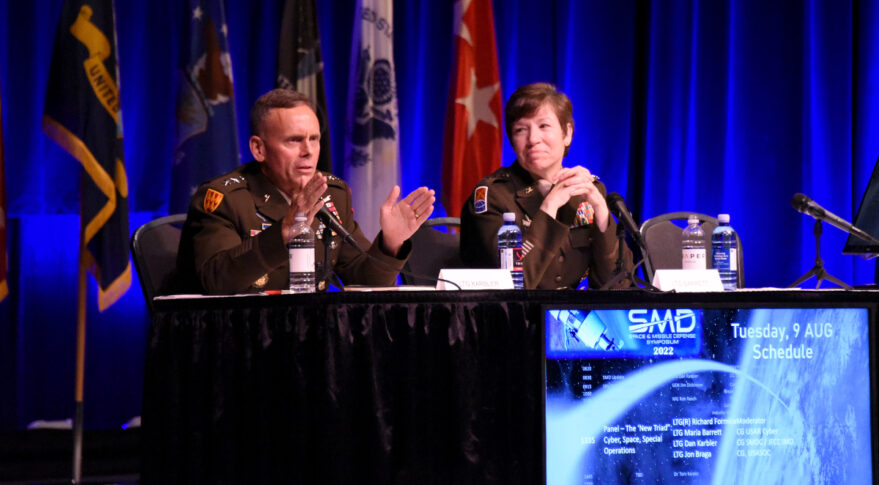New frontier
✓
The U.S. Army transferred its satellite ground stations to the Space Force on Monday as the latest step in establishing the sixth branch of the U.S. military devoted to demonstrating national dominance in space.
The U.S. Department of Defense announced the transfer last year, which took effect on August 15. All in all, 15 global units with 319 military and 259 civilian personnel from the Army and Navy will transfer to the Space Force’s Space Delta 8, the unit responsible for satellite communications, as stated in the announcement. Space Delta 8 is now in charge of the Wideband Global Satcom and Defense Satellite Communications System, a constellation of military communication satellites, as well as the Global Positioning System constellation for both military and civilian users, among other communication satellites, according to Space News. These satellites were originally built by the U.S. Air Force, and later operated by the military for decades.
In addition to the satellites, the army also transferred $78 million of its budget to the Space Force to cover the cost of operating the satellite ground stations. “We need to create this unity of effort around our space missions, to ensure we’re up to those challenges that we face,” Chance Saltzman, Space Force’s deputy chief of space operations for operations, cyber and nuclear, said in a statement. “The space domain has rapidly become far more congested, and far more contested than…when I was a lieutenant or a captain operating space capabilities.”
But other branches of the military aren’t totally out of the satellite game just yet. DARPA, part of the department of defense for military research, recently announced that it’s working on a plan to standardize communication between satellites in Earth orbit (including civil, government, and military satellites). The U.S. Army is also looking into ways to use space technology for nontraditional warfare.
The Space Force was created in December 2019 as a military branch for the final frontier, defined as the “first articulation of spacepower as a separate and distinct form of military power,” in a statement. Though it hasn’t happened yet, this so-called ‘spacepower’ seems to be preparing for a bleak future that involves the militarization of space as more countries like China set out for missions to the Moon and beyond. Unfortunately, resources in space are even more scarce, and more valuable, than resources on Earth, and until now, there are no clear laws on the distribution of these resources.
✓
Space News: TRIAD CONCEPT The idea of combining space, cyber and special operations warfare
Take a deep breath, ...Hold it
✓
✓

Army officials said space and cyber technologies should be used in support of special operations and information warfare
HUNTSVILLE, Ala. — The U.S. Army’s land forces for decades have relied on satellites for communications, navigation and early warning of missile attack. But the Army now wants to figure out other ways to use space technologies for nontraditional military operations such as cyber and information warfare.
Army leaders in panel discussions at the Space and Missile Defense Symposium said wars in the future will be fought in the space and cyber domains. And they argued that there should be more synergy among space, cyber and information warfare capabilities so they can be layered to greater effect.
The head of the Army Space and Missile Defense Command Lt. Gen. Daniel Karbler described the concept as a “triad of space, cyber and special operations.” This would require developing concepts of operations where surveillance satellites and cyber tools, for example, would be used in support of U.S. special forces that specialize in counterterrorism, information warfare and influence operations.
The idea was endorsed by the Army’s top cyberwarfare officer Lt. Gen, Maria Barrett, and the head of Army Special Operations Command Lt. Gen. Jon Braga, who made a joint appearance at the conference.
Using space and cyber technologies deliberately to locate targets, disrupt adversaries’ operations and gain information advantage is a departure from the Army’s traditional role of just being a passive consumer of GPS and satcom services.
Officials said the concept aligns with the Pentagon’s national defense strategy that calls for the military to develop non-lethal capabilities, including those that can disable enemies’ networks and satellites.
In a conflict against a peer competitor, “we need flexible options to counter disinformation, cyber attacks and asymmetric threats,” said Karbler. Space and cyber tools would complement traditional hard power to “address threats that transcend geographical boundaries and provide options when higher power escalatory options are less comfortable.”
Barrett said cyberwarfare capabilities, when combined with the global reach provided by space systems, could “disrupt adversary actions and shape adversary perceptions.”
.jpg)
.jpg)


No comments:
Post a Comment